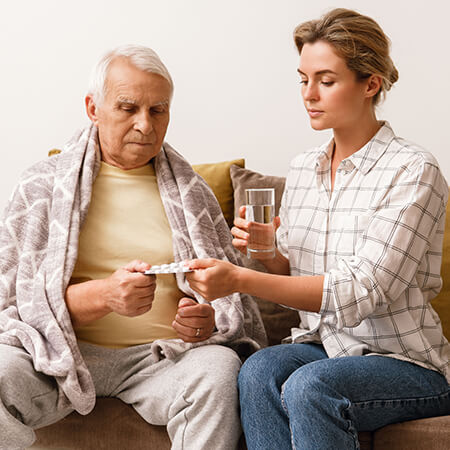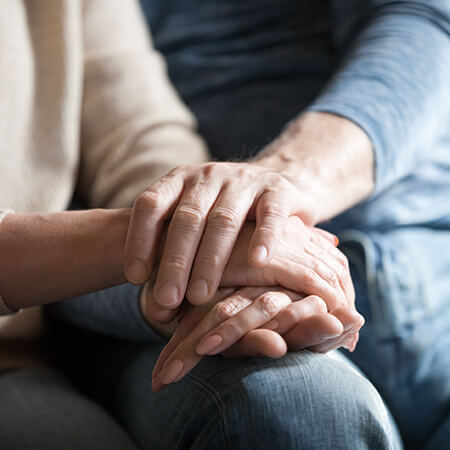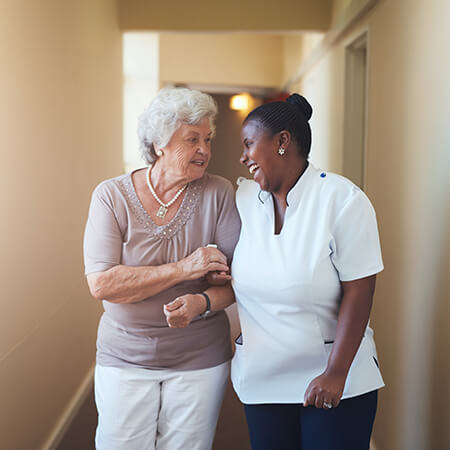


Remembering to take a prescribed medication in the correct dosages is imperative for the medications to be effective in treating the condition for which they have been prescribed. Missing scheduled doses – even just one scheduled dose – of certain medications could have severe effects on the body, some of which may result in death.
Forgetting to take medication is a common problem among the elderly. Given the confusion of old age in most cases and perhaps the onset of dementia in others, missing a dose of medication some point is almost a certainty. Studies have reported that even healthy Americans over the age of 50 take an average of four different medications per day. This average more than doubles in people who have underlying health conditions. With the number of prescription medications that America’s elderly population is taking, it would be quite easy for them.
While we can’t administer your medications, we can act as a medication alarm clock to remind you what should be taken and when.
By being mindful of type, dosage, and frequency, our Caregivers are able to coordinate with client or family to ensure that your loved one is taking the medication they need when they need it. Some of the medication reminder services we offer are:

Home accidents are a leading source of elderly injuries and can result in death. Seniors, whose bones are often less dense and more brittle, are especially vulnerable to severe injuries from home accidents. As we age, our senses of sight, touch, hearing, and smell have a tendency to decline. Our physical abilities are reduced and we experience a slowing of reaction time. As a result, we simply cannot respond to environmental hazards as rapidly as we could when we were younger. These normal changes in perception and physical ability allow for seemingly innocent details, even such as carpet wrinkles, to pose immediate danger to the health and wellbeing of your loved one.
Our Complimentary In Home Assessment allows us to address the immediate dangers facing your loved one. This service is completely free – it is our honor and privilege to help improve the at-home safety of your elderly family member.
According to the Centers for Disease Control and Prevention, each year, one in every three adults age 65 and older experiences an unintentional fall, and in many cases these falls are life-threatening. The good news is that the risk of falling in-home is largely preventable – and Newport Home Care has the knowledge and experience to help!

Many families are simply unaware as to the importance of home safety in regards to the elderly. It’s a tragedy to be made aware only after a fall occurs – especially if the fall is preventable, such as a slip in the shower due to the lack of a grab bar. First and foremost, we want our clients to understand why changes may be necessary, and also why we feel so emphatic about providing this service at no cost:
But tripping hazards are only a small part of our Home Safety Assessment service. The service is comprehensive and spans everything from fire alarms and escape plans, to security and emergency contact procedures. While we can’t guarantee your loved one will never be injured or at risk in their home, we can guarantee we’ve reduced the risk significantly – and this is something we always feel good about!
Our Home Safety Assessment Checklist was carefully and thoroughly developed, cross referencing safety suggestions and recommendation from a wide array of governmental and private duty organizations. When potential dangers are identified we will report the dangers to our client and their families along with our suggested solutions.
Regular medication reviews, clear labeling, and caregiver education are key strategies to improve medication safety in older adults.
Polypharmacy, drug interactions, and age-related changes in drug metabolism are primary concerns with medications for the elderly.
Consider the correct dosage, potential interactions, and the elderly person's ability to take the medication as prescribed.
Use pill organizers, clear instructions, and regular monitoring to prevent errors and ensure adherence to prescribed treatments.
Ensure a safe home environment, assist with mobility, monitor health conditions, and communicate clearly with healthcare providers.